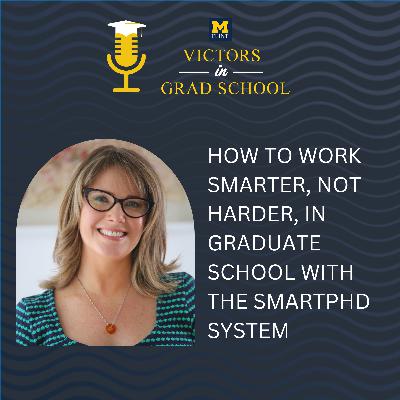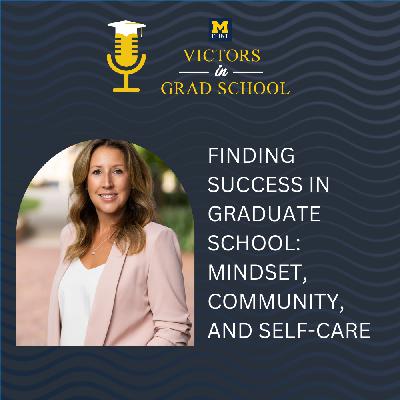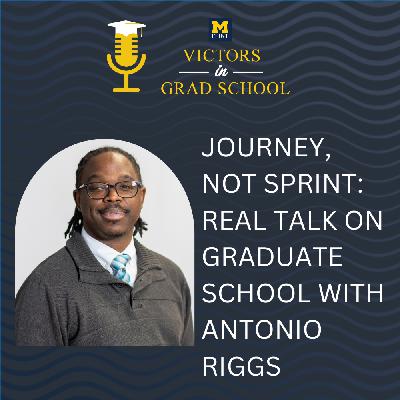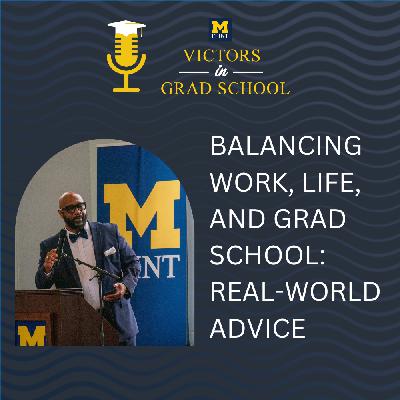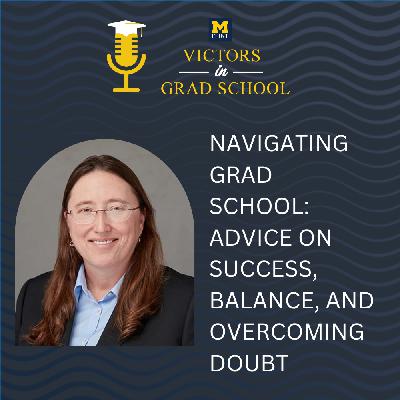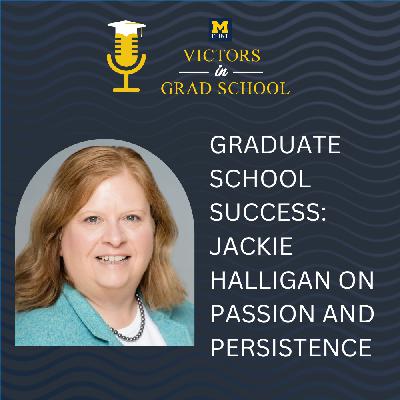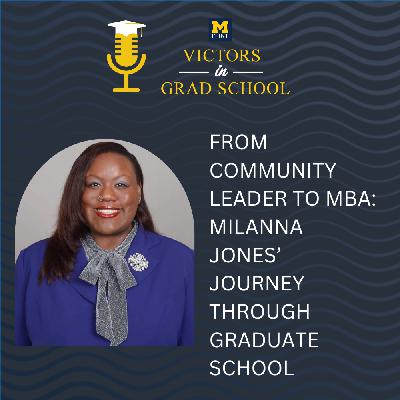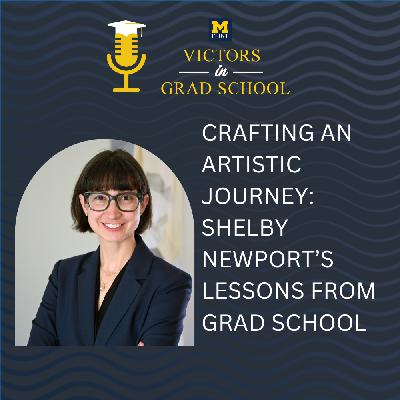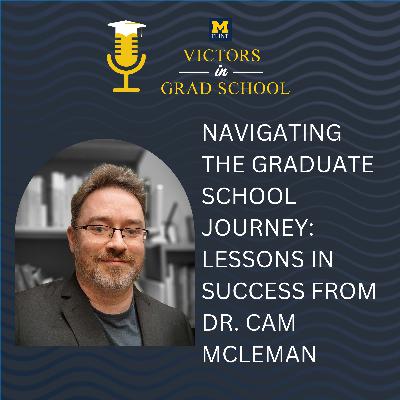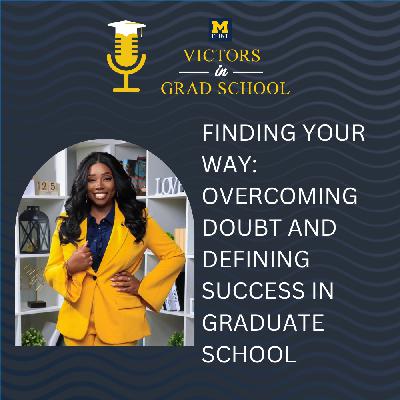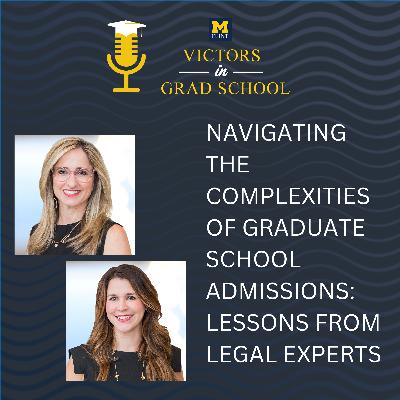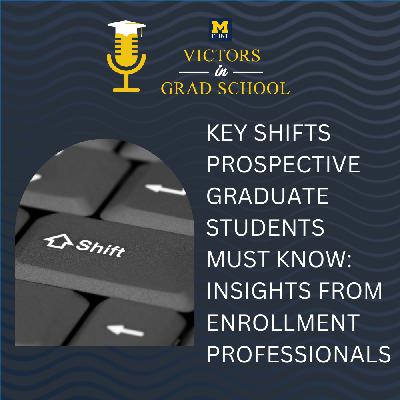Scott Roy Shares the Realities and Rewards of Graduate School
Description
Are you considering graduate school or already planning your path forward? The latest episode of “Victors in Grad School,” hosted by Dr. Christopher Lewis, is a must-listen for anyone pondering the next academic step. This week’s guest, Scott Roy—Registrar at the University of Michigan-Flint and graduate of both UM-Flint (undergraduate) and Eastern Michigan University (graduate)—shares a candid, relatable perspective on what it takes to succeed in graduate school and beyond.
The Many Paths to Graduate School
Scott’s journey reminds us that there’s no single route to grad school. Originally envisioning a law career, he pivoted to history after discovering his passion. This decision wasn’t made lightly; he evaluated the available programs in Michigan, taking into account not only program content but also logistical factors like proximity to family and program structure. Scott’s story highlights how practical considerations (such as avoiding an extensive thesis in favor of a final exam) and personal life (being close to his partner) can shape academic choices.
Graduate School Is a Different Beast
One of the strongest themes in the episode is the significant jump in academic rigor and expectations at the graduate level. Scott describes being “a deer in the headlights” during his first semester—faced with daunting reading lists and heavier workloads, often while juggling a job. His advice? Go in prepared for a step up in both self-discipline and time management. The episode offers heartfelt reassurance that feeling overwhelmed is normal, and that students do eventually adapt and find their rhythm.
Finding Balance and the Importance of Support
Scott is candid about the challenges of balancing work, school, and personal relationships—and about sometimes falling short. He urges prospective grad students to carve out space for self-care, mental health, and social connection. Loneliness can be a reality, especially with night classes and busy schedules, but joining campus organizations and building relationships with peers and professors can make the journey less isolating.
Skills for Life, Not Just for a Job Description
Even though Scott ultimately found his career path outside of museums and history, he credits his graduate studies with teaching him valuable skills—like research, problem solving, and personal growth—that enhanced his qualifications and shaped his perspective. It’s a reminder that grad school is about much more than a degree.
Whether you’re just thinking about grad school or already on your way, this episode is packed with wisdom, encouragement, and practical advice. Tune in to “Victors in Grad School” to hear Scott’s full story and gather the fuel you need for your own journey.
TRANSCRIPT
Dr. Christopher Lewis [00:00:01 ]:
Welcome to Victors in Grad School, where we have conversations with students, alumni, and experts about what it takes to find success in graduate school. Welcome back to Victors in Grad School. I'm your host, Dr. Christopher Lewis, Director of Graduate Programs at the University of Michigan, Flint. Really excited to have you back again this week. As always, every week, I love being able to have an opportunity to sit down, to talk to you, to work with you as you are going through this journey that you're on. And I call it a journey because it truly is a journey. Every person that is thinking about graduate school has to go through a journey for themselves.
Dr. Christopher Lewis [00:00:40 ]:
Whether you are at the very beginning where you're just starting to think about whether grad school is right for you, or you are applying right now, or maybe you've already applied and gotten accepted, There are many different places in this journey where you can do things to make the experience even easier. And then as you get into graduate school, there are things that you can do to be able to make yourself even more successful. That's what this podcast is all about. Every week, I love being able to bring you different people with different experiences that can share those experiences with you to allow for you an opportunity to be able to gain some tools for your own toolbox, but also allow for you to be able to prepare yourself a little bit better for the graduate school journey that you're on and that you will be on in the future. This week we've got another great guest. Scott Roy is with us today, and Scott works at the University of Michigan, Flint in the office of the Registrar. And Scott did his undergraduate work here at the University of Michigan, Flint, and then he went off and got a graduate degree in history at Eastern Michigan University. We're going to be talking about his own educational journey and allowing you to learn a little bit more from him.
Dr. Christopher Lewis [00:02:01 ]:
And I'm really excited to have him here. Scott, thanks so much for being here today.
Scott Roy [00:02:04 ]:
Thank you for having me.
Dr. Christopher Lewis [00:02:05 ]:
It is my pleasure having you here today. I really appreciate the opportunity to be able to talk to you. I mentioned the fact that you did your undergraduate work at the University of Michigan, Flint, and at some point, at some point in that journey, going through your undergraduate work, you made a choice. You made a choice that you wanted to continue your education. Take me back to that point and talk to me about what was going through your head as you figured out for yourself that graduate school was the next step.
Scott Roy [00:02:35 ]:
So I actually started my undergraduate degree not knowing what I wanted to do. I went into my Undergraduate thinking. I was going to go to law school. And then as I was choosing a major for my bachelor's degree, my advisor had recommended either English or history because he said a lot of law students chose those as their majors. So I went with history because that's the topic that I've always enjoyed. My family and I, we've always visited battlefields on vacation. We were Civil War reenactors. So history was just my thing.
Scott Roy [00:03:05 ]:
So I selected history. And about maybe two years or so into my degree, I decided that I didn't really want to be a lawyer. And so I didn't know what I wanted to do. I did actually decide that I wanted to do something in the history field. So I went to grad school with the idea of either becoming a professor or doing something in museums. So when I got to be about a junior, I started looking at different schools. There were only four schools in the state of Michigan that had history programs at the graduate level. So I was between Central Michigan University and Eastern.
Scott Roy [00:03:40 ]:
I ended up going down to Eastern. And then actually when I got to Eastern, I found out really that my niche was going into museums. So when I was at Eastern, my degree was in. But I also got a graduate certificate in Cultural Museum Studies. During that time, I was an intern down at the Historical Museum down in Monroe. And I got to do a lot of cool things down there. I got to lead tours, and I got to create different exhibits, do a lot of the curatorship at the museum there. And I realized that was kind of what I wanted to do with my life.
Scott Roy [00:04:13 ]:
So I stayed through graduate school, went through, got my master's, spent a couple years actually after graduate school trying to find a job and in the history field. And so I started out, right out of grad school. I started working at apartments. I was actually a leasing consultant leasing apartments. I did end up getting a job in a museum for about four years up in Frankenmuth. There's a military museum that I was a curator at. And then eventually, once I kind of settled down and I started to have kids and have a family, decided that I needed a more stable job. That's one thing I found actually, in my field is that museum jobs aren't always very stable.
Scott Roy [00:04:51 ]:
They depend on millages and grants and different fundraising. And so I decided at that point that I needed to find something more stable. That's how I ended up at U of M Flint.
Dr. Christopher Lewis [00:05:00 ]:
So, Scott, you mentioned the fact that you looked at a number of different schools when you were deciding on where you wanted to go to graduate school and you ultimately chose to go to Eastern Michigan University. Bring me back to that point. And when you were looking at different schools, what were you looking for and what made Eastern the right fit for you?
Scott Roy [00:05:19 ]:
So, so I originally was planning on going to U of M Flint actually for grad school because that's where I had gone for my undergrad. But like I said before, there were only four schools in the state that had a history degree and I knew that's what I wanted to pursue. U of M, Ann Arbor was an option. I didn't really look a whole lot at that. Part of the reason was because that they required 100 page thesis. I realized that I didn't want to necessarily get my doctorate degree. And those thesis tracks were more for students that were pursuing a doctorate. Eastern and Central had options where rather than writing the thesis, you could take an exam.
Scott Roy [00:05:56 ]:
And so I chose Eastern partly because you could take the exam, but also because my wife at the time, she was my girlfriend, but we ended up getting engaged. She got a job down in Metro Detroit. So if I was up at Central, I was going to be several hours away. Being down at Eastern, I could be c



